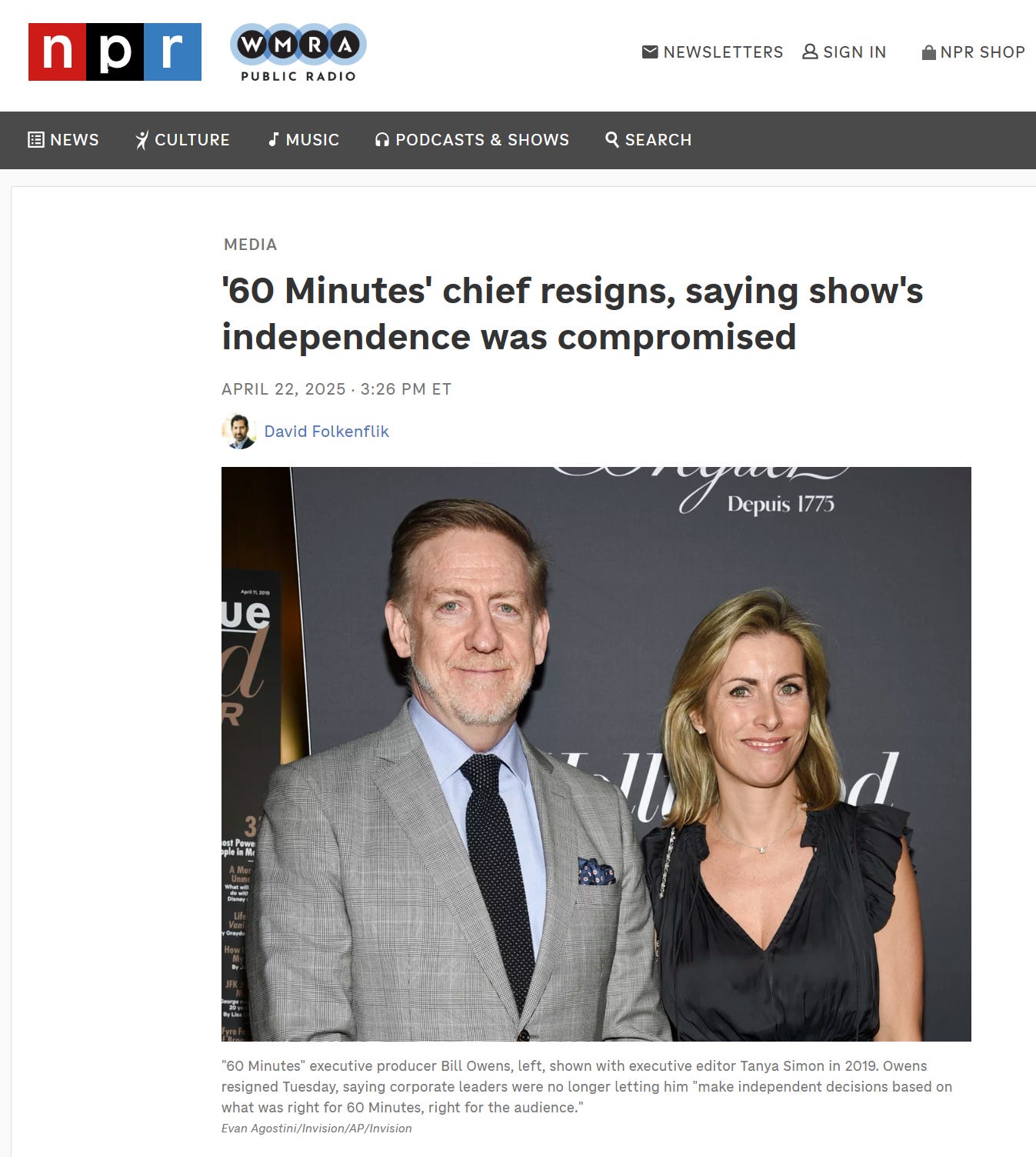When Serving the Brand Replaces Serving the People
The resignation of Bill Owens, longtime executive producer of CBS’s 60 Minutes, marks a pivotal moment in the ongoing debate over the role and responsibility of broadcast journalism in America. As detailed in the recent NPR article, Owens’ departure comes amid corporate turmoil, political lawsuits, and an ever-widening chasm between elite media producers and the public they claim to serve.
“I Would Not Be Allowed to Run the Show as I Have Always Run It”
In his public note and an emotional staff meeting, Owens lamented the loss of editorial independence:
“Over the past months, it has also become clear that I would not be allowed to run the show as I have always run it. To make independent decisions based on what was right for 60 Minutes, right for the audience. So, having defended this show—and what we stand for—from every angle, over time with everything I could, I am stepping aside so the show can move forward.”
But these words, intended as a defense of journalistic integrity, instead highlight a deeper problem: the rising arrogance and insularity of America’s journalistic elite. Owens repeatedly frames his decisions as “right for 60 Minutes,” not necessarily right for the American public. The show’s mission, it seems, has become self-referential—serving the needs and image of 60 Minutes as a brand, rather than as a public trust.
The Public Airwaves, The Private Club
Broadcast television, including 60 Minutes, operates on public airwaves—resources licensed by the government to serve the public interest. Yet, as the NPR article reports, “heavy-handed treatment of the show by corporate leaders” and a defensive, closed-ranks newsroom culture have created an environment where the show’s independence is measured by its ability to resist outside accountability, not its fidelity to fairness, transparency, or the diversity of public opinion.
When President Trump sued CBS’s parent company, Paramount, over alleged “unlawful acts of election and voter interference,” the network’s response was not to candidly engage with criticism or to clarify journalistic choices, but to dig in. The network initially refused to release the raw interview footage with then-Vice President Kamala Harris, only complying when compelled by the FCC under political pressure. Even then, 60 Minutes producers insisted their editorial choices had been beyond reproach—a stance that can seem dismissive to a skeptical public.
“Lost Independence from Corporate”—Or Public Accountability?
Owens told colleagues at his final meeting that he had “lost independence from corporate.” But what about independence from the insular worldview of the elite newsroom itself? When newsrooms become echo chambers—producing content that fits their own narratives rather than confronting uncomfortable truths or representing the full spectrum of American experience—they betray the very purpose of public service journalism.
As reported by NPR, 60 Minutes’s own correspondent Scott Pelley said, “This isn't something Bill is doing of his own volition: There was no choice in any of this.” The implication is that the real threat is from outside interference, not from within. Yet, by focusing so much on defending the show’s legacy and autonomy, the leadership at 60 Minutes has lost sight of a basic fact: the public airwaves are not a private clubhouse for journalists and executives—they are a national resource, meant to serve the people.
The Business Model vs. The Public Good
Perhaps the most telling aspect of this saga is how deeply the priorities of corporate business models have infiltrated elite journalistic culture. The pending sale of Paramount to Skydance Media, and the billions of dollars at stake for controlling owner Shari Redstone, loom large over editorial decisions. As NPR notes, these business interests are tightly intertwined with political power—David Ellison (Skydance CEO) is the son of Oracle’s Larry Ellison, a Trump ally.
The result is a newsroom culture where brand management, legal strategy, and corporate alliances matter as much as, if not more than, the public’s right to know. When journalism becomes primarily about what is “right for 60 Minutes,” it ceases to be public service and becomes self-service: a business, not a civic duty.
The Need for a New Public Ethos
Bill Owens urged his staff, in his parting note, to “stay the course,” promising that “60 Minutes will continue to cover the new administration, as we will report on future administrations. We will report from War zones, investigate injustices and educate our audience. In short, 60 Minutes will do what it has done for 57 years.”
But the American public deserves more than a promise to continue business as usual. It deserves a renewed commitment to openness, humility, and accountability—the qualities that define true public service journalism. Until elite media producers put the public interest above their own brands and business models, trust in journalism will continue to erode.
Musical rendition of this story: https://drive.google.com/file/d/1FFK_8UoOisGH5_pAX5QacMkqNRWU9N0i/view?usp=sharing
Reference:
NPR, ‘60 Minutes’ chief Bill Owens resigns as Trump lawsuit looms over CBS (April 22, 2025




